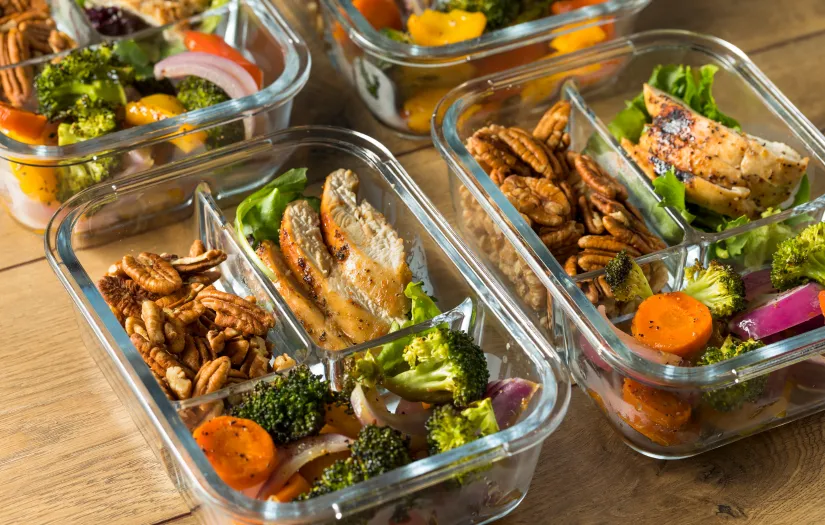
Achieve MMA Excellence With Precision Nutrition Planning
Achieve MMA Excellence With Precision Nutrition Planning
Proper nutrition is the cornerstone of MMA excellence, yet many fighters struggle to optimize their diet. This article will guide you through precision nutrition planning for MMA, focusing on macronutrient balance and strategic meal timing. You'll learn how to fuel your body effectively for peak performance, manage weight, and enhance recovery. By implementing these evidence-based strategies, you'll gain a competitive edge in the octagon and improve your overall athletic performance.
Optimize Your Macronutrient Intake for MMA Performance

Optimizing macronutrient intake is crucial for MMA performance. Fighters must calculate daily caloric needs, balance proteins, carbs, and fats, and adjust based on training intensity. Proper nutrient tracking ensures optimal energy levels for knockout power, gym performance, speed, and endurance. Incorporating fight-camps and precision nutrition planning can elevate a fighter's overall performance in the octagon.
Calculate Your Daily Caloric Needs for Training
Calculating daily caloric needs is essential for MMA fighters to fuel their fight-camps intense training regimens. A strength and conditioning coach can help determine the precise energy requirements based on factors such as body weight, training intensity, and specific goals Athlete Management. This calculation forms the foundation for optimizing performance in various aspects of MMA, including wrestling, sprinting, and weight management. Book a Call
Fighters must consider the heat generated during high-intensity workouts when estimating their caloric needs. The energy expenditure during wrestling sessions, sprint intervals, and strength training can significantly impact the total daily caloric requirement. By accurately assessing these factors, fighters can ensure they consume enough calories to support their rigorous training while maintaining optimal body composition for their weight class.
Balance Proteins, Carbs, and Fats in Your Diet
Balancing proteins, carbohydrates, and fats is crucial for MMA fighters to optimize their performance in the cage. Protein intake supports muscle recovery and growth, especially after intense clean and jerk sessions or combat sport training. Carbohydrates provide the necessary energy for high-intensity workouts and help maintain glycogen stores for endurance during long fights.
Fats play a vital role in hormone production and joint health, which are essential for fighters' longevity in the sport. A sports medicine professional can help tailor the macronutrient balance to an individual fighter's needs, considering factors such as weight class, training intensity, and recovery requirements. This personalized approach ensures that fighters maintain optimal energy levels and performance throughout their training camps and competitions.
Adjust Macronutrients Based on Training Intensity
MMA fighters must adjust their macronutrient intake based on training intensity to optimize performance. During high-intensity Muay Thai or boxing sessions, athletes require increased carbohydrate intake to fuel explosive movements and maintain cardiorespiratory fitness. Conversely, during weight loss phases or less intense training periods, fighters may reduce carbohydrate intake while maintaining adequate protein to preserve muscle mass.
Strength and conditioning coaches often recommend incorporating medicine ball exercises to enhance power and core strength, which may necessitate adjustments in protein intake for muscle recovery. As training intensity fluctuates throughout a fight camp, fighters should work closely with nutrition experts to fine-tune their macronutrient ratios, ensuring optimal energy levels and recovery for peak performance in the cage.
Monitor and Track Your Nutrient Consumption
Monitoring and tracking nutrient consumption is essential for MMA fighters to optimize their performance. By utilizing nutrition tracking apps or working with a sports nutritionist, athletes can ensure they meet their macronutrient goals while maintaining the energy levels required for intense training sessions, including bench press workouts and swimming exercises. This precise approach allows fighters to fine-tune their diet based on their specific sport requirements and training phases.
Accurate nutrient tracking enables MMA fighters to make data-driven decisions about their diet, supporting their performance goals. Whether training at American Top Team or preparing for a championship bout, consistently monitoring macronutrient intake helps athletes identify areas for improvement and adjust their nutrition plan accordingly. This meticulous approach to nutrition planning can be the difference between achieving peak performance and falling short of one's competitive goals in the demanding world of mixed martial arts.
Implement Strategic Meal Timing for Peak Energy Levels

Strategic meal timing is crucial for MMA fighters to maintain peak energy levels during intense training and combat. This section explores how to plan pre-workout meals for maximum performance, schedule post-workout nutrition for optimal recovery, and incorporate snacks to sustain energy throughout the day. Proper timing helps manage stress, regulate blood sugar, and optimize fat utilization during exercise.
Plan Pre-Workout Meals for Maximum Performance
MMA fighters can optimize their performance by carefully planning pre-workout meals. Consuming a balanced meal containing complex carbohydrates and lean protein 2-3 hours before training helps maintain stable blood sugar levels and provides sustained energy for intense leg workouts and elbow strikes. This approach supports heart function during high-intensity intervals and reduces the risk of acid buildup in muscles.
Fighters should consider individual digestive needs when timing pre-workout nutrition. Some athletes benefit from a small, easily digestible snack 30-60 minutes before training to top up energy stores. Proper pre-workout nutrition, combined with other recovery strategies like cryotherapy, can enhance overall performance and reduce fatigue during grueling MMA sessions.
Schedule Post-Workout Nutrition for Recovery
Effective post-workout nutrition is crucial for MMA fighters to optimize recovery and performance. Research conducted in the United States has shown that consuming a combination of fast-absorbing carbohydrates and high-quality protein within 30 minutes after training helps replenish glycogen stores and support muscle repair. This timing is especially important after intense squat sessions or high heart rate activities that deplete energy reserves.
Sports science emphasizes the importance of hydration in post-workout recovery for MMA athletes. Rehydrating with water or electrolyte-rich beverages helps restore fluid balance and supports the body's natural recovery processes. Additionally, consuming easily digestible foods can help reduce the buildup of lactic acid and other metabolic byproducts, minimizing muscle soreness and improving gas exchange in the body's tissues.
Incorporate Snacks to Sustain Energy Throughout the Day
MMA fighters can maintain consistent energy levels throughout the day by incorporating strategic snacks between meals. These snacks should combine complex carbohydrates and lean proteins to support sustained energy during intense training sessions, including kick drills and strength training exercises. Properly timed snacks help prevent fatigue and maintain focus during long training days.
Athletes should choose nutrient-dense snacks that are easily digestible and support their training goals. Options such as Greek yogurt with berries or a small handful of nuts with a piece of fruit can provide quick energy for afternoon drills without causing discomfort during high-intensity workouts. By strategically timing these snacks, fighters can optimize their performance and reduce the risk of burnout during demanding training cycles.
Include Essential Micronutrients for MMA Success

Essential micronutrients play a crucial role in MMA performance. Fighters must identify key vitamins and minerals, integrate nutrient-rich foods, and use supplements wisely. Proper micronutrient intake supports kickboxing endurance, lung function, and hand strength while preventing dehydration. A personal trainer can help athletes optimize their micronutrient strategy for peak performance in the cage.
Identify Key Vitamins and Minerals for Fighters
Identifying key vitamins and minerals is crucial for MMA fighters to optimize their performance. Vitamin D plays a vital role in maintaining bone health and supporting mental acuity during intense martial arts training. Iron is essential for oxygen transport, ensuring fighters maintain high energy levels during grueling footwork drills and extended sparring sessions.
Magnesium aids in muscle recovery and helps prevent injury by supporting proper nerve function. Calcium is crucial for maintaining strong bones, which is particularly important for fighters who engage in high-impact training. By focusing on these essential micronutrients, MMA athletes can enhance their overall performance and reduce the risk of nutritional deficiencies that may hinder their progress in the sport.
Integrate Micronutrient-Rich Foods Into Your Diet
Integrating micronutrient-rich foods into an MMA fighter's diet is essential for optimal performance. Athletes like Amanda Nunes incorporate a variety of nutrient-dense foods to support their rigorous training regimens. Leafy greens, berries, and lean meats provide vital vitamins and minerals that aid in recovery after intense powerlifting sessions and deadlifts. For those looking to enhance their dietary approach for better performance, exploring specialized performance nutrition strategies can be invaluable.
MMA fighters benefit from consuming foods high in antioxidants to combat lactic acid buildup during high-intensity workouts. Colorful fruits and vegetables, nuts, and seeds offer a wide range of micronutrients that support overall health and athletic performance. By prioritizing these nutrient-rich foods, fighters can enhance their endurance, strength, and recovery capabilities in the octagon.
Use Supplements Wisely to Support Nutrition
MMA fighters can enhance their performance by using supplements wisely to support their nutrition. Creatine monohydrate, for example, has been shown to increase energy production in skeletal muscle, improving strength and power output during barbell exercises. Athletes should consult with a sports nutritionist to determine which supplements can effectively complement their diet and training regimen.
While supplements can be beneficial, they should not replace a balanced diet rich in whole foods. MMA fighters should focus on obtaining essential nutrients from their meals and use supplements strategically to address specific needs. For instance, branched-chain amino acids (BCAAs) may help maintain muscle mass and improve agility during intense physical education sessions. However, athletes must be cautious of potential interactions between supplements and adhere to anti-doping regulations in their sport.
Manage Weight Effectively Through Nutrition Strategies

Effective weight management is crucial for MMA success, impacting VO2 max, energy systems, and cardiac output. This section explores determining optimal weight class, implementing safe weight cutting techniques, and preserving lean muscle mass during training. By focusing on these strategies, fighters can optimize their performance ratio and enhance aerobic exercise capacity for peak competition readiness.
Determine the Optimal Weight Class for You
Determining the optimal weight class for MMA fighters involves assessing their body composition, strength, and athletic performance. Fighters must consider their natural weight, muscle mass, and the impact of weight cutting on their judo techniques and overall performance. A thorough evaluation of hip and ankle mobility can help athletes identify the weight class that allows them to maintain optimal strength and agility without compromising their health.
Adaptation to a new weight class requires careful monitoring of the fighter's pain levels and recovery time. Athletes should work closely with nutrition experts and strength coaches to develop a personalized plan that supports their transition to the ideal weight class. This approach ensures fighters can maintain their competitive edge while minimizing the risk of injury and long-term health issues associated with extreme weight fluctuations.
Implement Techniques for Safe Weight Cutting
Safe weight cutting techniques are essential for MMA fighters to maintain optimal performance. A well-designed program incorporates gradual weight reduction through careful nutrition planning and hydration management. Fighters can leverage their knowledge of creatine's effects on water retention to fine-tune their weight-cutting approach, ensuring they reach their target weight without compromising strength or endurance.
Effective weight management strategies focus on preserving muscle mass while reducing body fat. Fighters can use medicine ball exercises to maintain functional strength during the weight-cutting phase, supporting their metabolism and preventing excessive muscle loss. By implementing these techniques under professional guidance, athletes can achieve their weight goals safely and efficiently, setting the stage for peak performance in the octagon.
Preserve Lean Muscle Mass During Training
Preserving lean muscle mass during training is crucial for MMA fighters to maintain optimal body composition and explosive power. Athletes can achieve muscle hypertrophy by incorporating resistance exercises similar to those used in tennis training, which stimulate muscle growth while enhancing overall athletic performance. By focusing on compound movements and progressive overload, fighters can build and maintain lean muscle mass even during intense fight preparation phases.
Proper nutrition plays a vital role in preserving lean muscle mass during training and competition. MMA fighters should consume adequate protein and carbohydrates to support muscle recovery and energy levels. Timing nutrient intake around workouts helps maximize muscle protein synthesis and minimize muscle breakdown, ensuring athletes maintain their strength and power for explosive movements in the cage. This approach to nutrition and training allows fighters to optimize their body composition for peak performance.
Hydrate Properly to Enhance Performance and Recovery

Proper hydration is crucial for MMA fighters, impacting endurance training, grappling performance, and weight cutting. This section explores the importance of hydration in MMA, creating effective hydration plans for training and fights, and rehydrating strategies following weigh-ins. By optimizing fluid intake, fighters can enhance their takedown abilities and maintain optimal adipose tissue levels for peak performance.
Understand the Importance of Hydration in MMA
Proper hydration is crucial for MMA fighters, directly impacting their performance during interval training and muscle endurance. Adequate fluid intake supports optimal nutrient transport, including carbohydrates, to working muscles, enhancing energy levels and skill execution. Fighters who maintain proper hydration levels experience improved cardiovascular function and reduced fatigue during intense training sessions.
Dehydration can significantly impair a fighter's abilities, leading to decreased strength, reduced cognitive function, and impaired temperature regulation. MMA athletes must prioritize hydration as part of their overall nutrition strategy to maintain peak performance throughout training camps and competitions. By understanding the importance of hydration, fighters can optimize their physical and mental capabilities in the octagon.
Create a Hydration Plan for Training and Fights
MMA fighters should create a comprehensive hydration plan that addresses their fluid needs during training and fights. This plan should account for the intensity of dumbbell workouts, sparring sessions, and other high-energy activities. By monitoring fluid intake and adjusting based on training intensity, fighters can maintain optimal hydration levels, enhancing their performance and recovery.
Experienced fighters from Brazil often emphasize the importance of tailoring hydration strategies to individual needs and environmental conditions. Fighters should consider factors such as climate, training duration, and weight management goals when developing their hydration plan. By gathering information on personal sweat rates and electrolyte losses, athletes can fine-tune their fluid intake to support peak performance during both training and competition.
Rehydrate Properly Following Weigh-Ins
Proper rehydration following weigh-ins is a critical aspect of MMA performance, requiring the precision of a marathon runner's nutrition plan. Fighters must replenish fluids and electrolytes lost during weight cutting to restore core stability and shoulder function. Rehydration strategies should begin immediately after weigh-ins, with athletes consuming a calculated amount of fluids based on their weight loss.
MMA athletes can optimize their rehydration process by incorporating electrolyte-rich beverages and easily digestible carbohydrates. This approach supports the restoration of glycogen stores and muscle hydration, essential for maintaining the frequency and power of strikes during a fight. Proper rehydration not only enhances physical performance but also supports the mental focus required in the art of combat sports.
Customize Your Nutrition Plan to Your MMA Goals

Customizing nutrition plans for MMA goals is essential for peak performance. This section explores setting specific nutritional objectives, adjusting diets according to training phases, and consulting nutritionists for personalized guidance. Athletes can optimize their plyometrics, karate techniques, and rope work by tailoring their nutrition to support training intensity and performance goals, debunking common myths about MMA nutrition.
Set Specific Nutritional Objectives for Improvement
MMA fighters must set specific nutritional objectives to improve their performance across weight classes. By leveraging technology to track macronutrient intake, athletes can optimize their punch power and endurance. This data-driven approach allows fighters to fine-tune their nutrition plans, ensuring they meet the demands of intense training sessions and maintain peak health.
Customizing nutritional goals based on individual needs helps fighters address specific areas of improvement, such as increasing lean muscle mass or enhancing recovery. For example, a fighter looking to build strength might focus on protein intake and timing around tire-flipping workouts, while another athlete may prioritize carbohydrate consumption to fuel high-intensity training sessions. This tailored approach ensures each fighter's nutrition plan aligns with their unique performance objectives.
Adjust Your Diet According to Training Phases
MMA fighters must adapt their diets to match different training phases, optimizing nutrition for peak performance. During high-intensity periods focused on improving striking force and foot speed, athletes increase carbohydrate intake to fuel explosive movements. Conversely, in phases emphasizing flexibility and technical skills, fighters may adjust their macronutrient ratios to support recovery and muscle repair.
Nutrition plans should account for the physical demands of each training phase, including the risk of concussions and the need for proper gear. As fighters progress through their camp, they may need to increase protein intake to support muscle repair and maintain strength. This tailored approach ensures athletes have the necessary nutrients to enhance their performance while minimizing the risk of injury and optimizing recovery between intense training sessions.
Consult a Nutritionist for Personalized Guidance
Consulting a nutritionist provides MMA fighters with personalized guidance tailored to their unique physiological needs. A professional can help athletes optimize their protein intake based on individual factors such as body composition and training intensity. This expertise is crucial for developing nutrition strategies that support the demanding burpee workouts and high-intensity training sessions common in MMA preparation.
Nutritionists offer valuable feedback on diet plans, helping fighters like Yoel Romero fine-tune their nutrition for peak performance. By analyzing an athlete's physiology and training regimen, nutritionists can create customized meal plans that enhance recovery, support muscle growth, and improve overall energy levels. This personalized approach ensures that fighters receive the precise nutritional support needed to excel in their demanding sport.
Conclusion
Precision nutrition planning is a cornerstone of MMA excellence, encompassing tailored macronutrient intake, strategic meal timing, and essential micronutrient consumption. By optimizing these nutritional aspects, fighters can enhance their performance, recovery, and overall health, leading to improved strength, endurance, and mental acuity in the octagon. Effective weight management and proper hydration strategies further contribute to an athlete's success, ensuring they compete at their optimal weight class while maintaining peak physical condition. Customizing nutrition plans to individual goals and training phases, with guidance from professional nutritionists, allows MMA fighters to maximize their potential and achieve excellence in this demanding sport.
Frequently Asked Questions
Can nutrition supplements enhance sports performance in athletes??
Nutrition supplements have become increasingly popular among athletes looking to enhance their sports performance. These supplements, such as protein powders, creatine, and branched-chain amino acids, are designed to provide additional nutrients that may be lacking in an athlete's diet or to support specific health and performance goals. For example, protein supplements can help athletes meet their daily protein requirements for muscle growth and repair, while creatine is known to improve strength and power output during high-intensity activities.
While nutrition supplements can be a valuable addition to an athlete's regimen, it is important to note that they should not replace a balanced diet. Eating a variety of nutrient-rich foods is still the best way to meet an athlete's nutritional needs. Some supplements may also come with risks or side effects, especially when misused or taken in excessive amounts. Athletes should always consult with a qualified healthcare provider or sports nutritionist before incorporating supplements into their training routine to ensure they are safe and effective for their individual needs. In conclusion, when used properly and in conjunction with a well-rounded diet and training program, nutrition supplements can play a positive role in enhancing sports performance for athletes.
What are the effects of dehydration on athletic performance??
Dehydration can have a significant impact on athletic performance, as even slight fluid deficits can lead to decreased endurance, strength, and overall physical performance. When an athlete is dehydrated, their body's ability to regulate temperature and transport nutrients to muscles is compromised, resulting in reduced energy levels and increased fatigue. In addition, dehydration can impair mental focus and coordination, affecting an athlete's reaction time and decision-making abilities during training or competition.
Furthermore, dehydration can increase the risk of heat-related illnesses such as heat exhaustion or heat stroke, especially during intense physical activity in hot and humid conditions. It can also lead to muscle cramps, which can hinder an athlete's ability to perform optimally and increase the likelihood of sustaining injuries. Proper hydration is crucial for maintaining overall health and performance, as it helps support proper muscle function, lubricate joints, and remove waste products from the body.
To prevent dehydration and its negative effects on athletic performance, athletes should prioritize staying adequately hydrated before, during, and after physical activity. Monitoring fluid intake, especially during intense training sessions or competitions, and replenishing electrolytes lost through sweat are essential steps to support optimal performance and recovery. By paying attention to their hydration levels, athletes can maximize their performance potential and reduce the risk of experiencing the negative consequences of dehydration.
How does nutrition affect injury prevention in athletes??
Nutrition plays a critical role in injury prevention for athletes by providing the body with the necessary nutrients for optimal function and performance. A well-balanced diet can help athletes maintain strong muscles, bones, and connective tissues, reducing the risk of injuries during training and competitions. Proteins are essential for muscle repair and building, while carbohydrates provide the energy needed for intense workouts. Adequate intake of vitamins and minerals such as calcium, vitamin D, and iron are also crucial for maintaining bone health and preventing stress fractures.
Hydration is another key aspect of nutrition that directly impacts injury prevention. Proper fluid intake helps regulate body temperature, lubricate joints, and transport nutrients to cells, all of which are vital for injury prevention. Electrolytes such as sodium and potassium are especially important for maintaining proper hydration levels and preventing muscle cramps. In addition, antioxidants found in fruits and vegetables help reduce inflammation and oxidative stress, which can contribute to injuries over time. Overall, a well-rounded and nutrient-dense diet is essential for athletes to stay healthy, strong, and injury-free.







